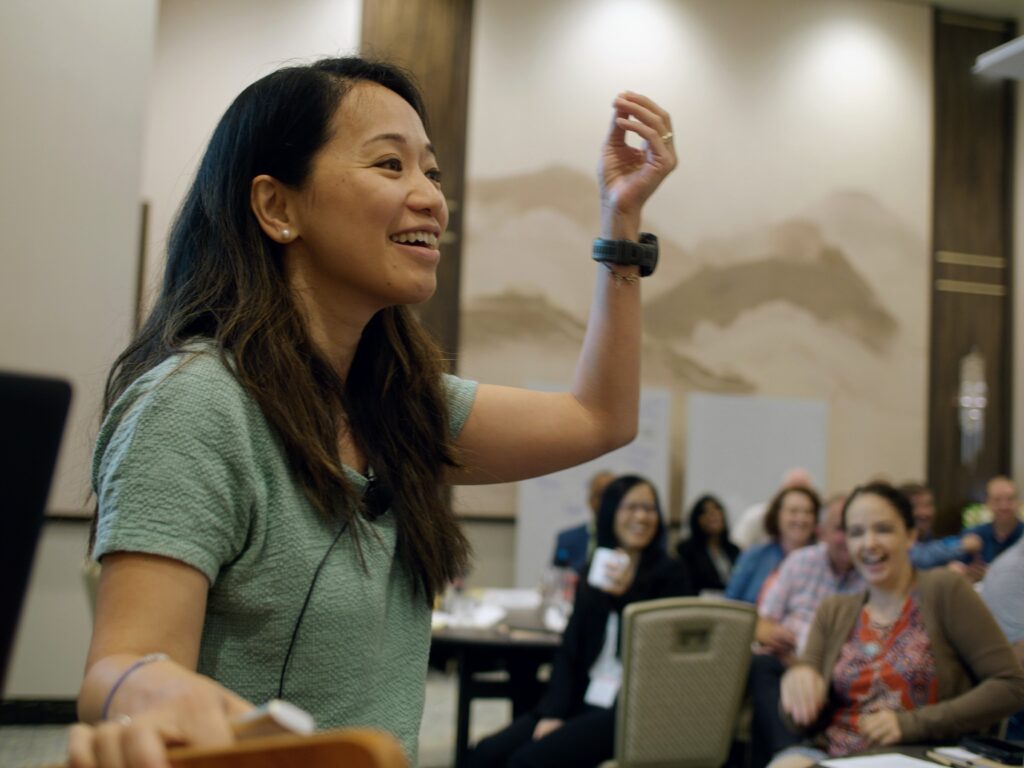November 17, 2025 / Esther Choy

“Feedback is a gift,” says Morgan in an episode of the comedy series Nobody Wants This set in Los Angeles. “So lay it on.” While this character is looking for feedback on dating relationships, she captures a higher truth applicable to all of us. Honest feedback is a gift. Feedback helps us understand the world and ourselves from some else’s point of view. When it comes to leadership storytelling, understanding how our stories are landing with our audience is a crucial piece of data we need to turn good stories into the most impactful stories.
We may have the most engaging or funny story to tell, but if it is not applicable to our audience, it won’t achieve our intended impact. Certified Story Facilitator and advocate for agricultural workers Luawanna Hallstrom underscored this idea in a recent interview about the power of storytelling. She said, “In my life, I’ve always believed that story was probably the most impactful way to make change. [I’ve learned] to include the audience in the process. Don’t just talk at them. Make them part of the process, because that’s how what you’re teaching becomes really valuable.”
Collecting specific and honest feedback is a surefire way to include your audience in the storytelling process and make sure your stories have the impact you want them to have.
How to Collect Helpful Feedback On Your Leadership Story
To collect feedback to help you improve your leadership stories, you will need to test your story with a friend or colleague in a low-stakes situation before you share it at a team meeting, networking event or conference.
After you share the story, ask for feedback. But take care in what kind of questions you ask. If you ask general questions like “What did you think of the story?” You will likely get general feedback. “It was good,” your friend may reply. “I really liked it.”
Though this answer may make us feel good, it doesn’t tell why they liked the story or help us figure out how the story might be improved. Instead ask these three specific questions to make sure you get feedback that will help you tell impactful stories that are worth telling at work.
Feedback Q1: What information do you recall from my story?
Because we are all inundated with information everyday, stories help us share data in a way that helps our audience to remember it. This question will help you make sure that the story relates what you want to convey to your audience. People sometimes remember the most random information. By asking our test audience out what has stuck with them, and what hasn’t, you will understand what part of your story is memorable.
For example, if your colleague only remembers the color of former first lady of Philippines Imelda Marcos’ fanciest pair of shoes, but you wanted her to remember that Marcos owned 1,060 pairs of shoes, you will need to consider cutting the details about the color so as not to distract from the point you are trying to make.
Once you’ve collected the feedback, you’re much better informed and positioned to refine your stories so people remember the parts you want them to remember.
Feedback Q2: How does my story make you feel?
The emotion evoked by your story is likely to have a longer-lasting impact on your audience than any of the actual data. Does your test audience feel inspired? Maybe your story reminded him of an experience of his own? But maybe he feels confused or deflated after your test run? Maybe he started glancing at his phone, hoping this conversation will be over soon. We won’t know how a story is making our audience feel until we ask them.
For example, a client of mine once told a story with the intention of trying to inspire people to care about sustainable farming. But the story of a particular farmer she used to illustrate why we should care was so dire and sad, the test audience felt only despair when the story was over. They didn’t even have any follow up questions for her. After this test session, my client realized her story was too extreme and she needed to use a different farmer example so as not to overwhelm her audience.
We want our stories to inspire curiosity and question-asking. In fact, encouraging your audience to ask questions is an ideal place to start a conversation after a story, whether in the context of a formal job interview or casual networking. That’s what the next question is all about.
Feedback Q3: After listening to my story, what questions do you have for me?
This is the target at which we should all aim: inspiring the right questions in our audience. Maybe the first or second draft of your story hasn’t inspired many questions. But shaping it to the point where your audience begins to have questions is a sure sign that you’re on the right track. This question will help you gauge whether the types of questions your story prompted, lead to the type of topics that you hope to discuss after sharing the story.
Another way of asking this question is: after listening to my story, what actions would you take? Often the goal of business storytelling is to inspire your audience to take some form of action with the knowledge they acquired from your story. Leaving your audience inspired to take action is a key part of providing a satisfying end to your business story.
For instance, I’ve told a story about seizing the moment and jumping in Lake Michigan with my family. A passing stranger took it upon herself to record this special moment and share the video with us after we had climbed back out of the lake. From feedback I’ve learned that depending on how I frame the story, I can inspire questions about taking advantage of opportunities or about being proactive versus waiting to be asked to take the lead.
Listening to the kinds of questions or actions your story inspires will help you make sure you are framing your story to meet the needs of your specific audience.
How To Collect Feedback To Improve Our Leadership Stories
Stories are sticky. We remember them for days and even years after they’ve been told to us. So when we are taking the time to share stories at work, we should take the time to make sure we are telling the best stories possible.
To make sure we are telling the stories that have the impact we want them to have, it’s crucial that we collect helpful feedback – feedback that will help us improve how our audience receives the story.
The first thing we need to do is find a test audience — a friend or colleague who has a few moments to share with you and listen to the story. Then, we need to ask the right follow up questions:
- What info do you recall from my story?
- How did my story make you feel?
- What questions do you have for me?
These three questions will provide you with specific information on what kind of impact your story is having on your test audience. The answers you get may surprise you!
A lot of the best storytellers I know are part of a storytelling community where they can test their stories, receive helpful feedback, and listen to other people’s stories regularly. Consider starting a storytelling employee resource group, like Story Lab, at your workplace.
Related Articles
How To Get More Honest Feedback
Collecting Stories Will Make You Happier
Better Every Story
Leadership Transformation through Storytelling
"This is an amazing and insightful post! I hadn’t thought of that so you broadened my perspective. I always appreciate your insight!" - Dan B.
Get Esther Choy’s insights, best practices and examples of great storytelling to your inbox each month.




